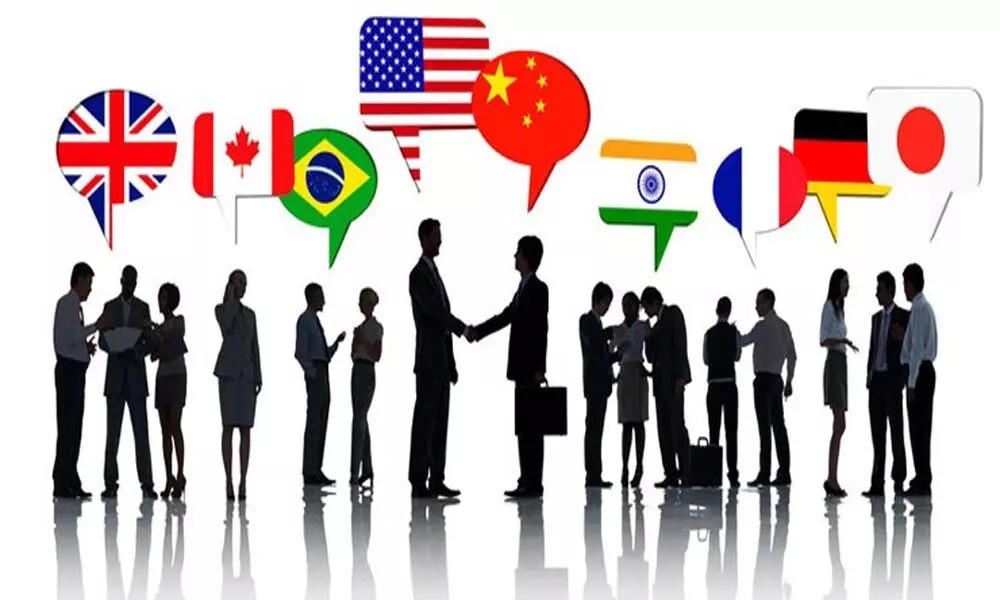How leaders struggle with duality in intl relations during conflicts
It is often stated that there are more possible moves in a chess game than atoms in the universe. The same is true in the game of diplomacy
image for illustrative purpose

The Russian -Ukraine conflict has highlighted how the world order and international relationships are a duality in nature, basically meaning "having two parts often with opposite meanings." Close scrutiny of the statement made by various leaders highlights the struggle of duality
In the past three weeks since Russia's "invasion" of Ukraine, both the West, led by the United States and Moscow, have indulged in diplomatic and military moves and counter-moves in Ukraine- the latest international chessboard.
It is often stated that there are "more possible moves in a chess game than atoms in the universe." The same is true in the game of diplomacy.
Take the example of the West that imposed "crippling sanctions" on Russia, including barring it from the global SWIFT system. However, key EU nations such as Germany, Italy, France, the Netherlands and frontline States such as Poland, Lithuania, Romania, and Finland continue to import Russian oil and gas despite the sanctions. At the same time, the US termed India's stand on the conflict as "somewhat shaky."
The Russia -Ukraine conflict has brought to the forefront the challenge of duality in international relations that leaders struggle with during conflicts. However, one underlining truth that remains constant among leaders is the primacy of national interest.
In 1848, Lord Palmerston, former Prime Minister, in a speech in the British Parliament, had said, "We have no eternal allies, and we have no perpetual enemies. Our interests are eternal and perpetual, and those interests it is our duty to follow." Basically, there are no permanent friends or enemies in international relationships - there are only permanent national interests.
As NATO tries to create fortification around President Volodymyr Zelensky through sanctions, a series of failed UN resolutions and diplomatic manoeuvres aimed at Moscow, Russia, on his part, has escalated the cost on Kyiv; by turning towns & cities into "ruins." Some media reports also claim that Putin had sent in a large contingent of "vicious Chechen special forces" with orders to assassinate president Zelensky; however, the special unit was neutralised by Ukraine forces.
The Russian -Ukraine conflict has highlighted how the world order and international relationships are a duality in nature, basically meaning "having two parts often with opposite meanings." Close scrutiny of the statement made by various leaders highlights the struggle of duality.
For example, US President Joe Biden pointed India out as "somewhat shaky" among the Quad nations in its response to Russia's invasion. Whitehouse also cautioned all countries to think about where they want "to stand when history books are written at this moment in time."
India has faced criticism from the West for engaging in business with Russia. New Delhi, on its part, has urged an end to the violence in Ukraine while abstaining from voting against Russia; this geopolitical balancing act is "frustrating" the Biden administration, says an American observer (who doesn't want to be named). The American duality is that while it is perplexed at India's stand on the Ukraine conflict, the US sees New Delhi as a critical partner for countering China's rising influence in Asia. Further, there is an understanding within the US about India's catch-22 situation due to its dependence on Russian military supplies.
Similarly, during the Indo-Britain trade talks, UK trade minister Anne-Marie Trevelyan said India's refusal to condemn Russia's actions has left Britain "very disappointed." While the British maintain that Prime Minister Boris Johnson also recognises India's relationship with Putin and his regime.
In spite of being a P5 member, China has refused to fulfil its international obligation in condemning Russia for its actions in Ukraine. On the contrary, it has repeatedly expressed its opposition to what it describes as illegal sanctions on Russia. The so-called "strongest statement" on the Ukraine conflict from Chinese President Xi Jinping, only called for "maximum restraint" in Ukraine while adding that China was "pained to see the flames of war reignited in Europe."
Far above the Earth in space, there is another duality in play. After sanctions, "there were some fears that the Russian Space Agency would ditch Vande Hei, an American astronaut who is scheduled to return to Earth in a Russian capsule from the International Space Station on March 30." Despite the concerns, NASA said, "Vande will be on the Soyuz rocket later this month and will touch down in Kazakhstan as planned.
Thus, the conflict nor follow up sanctions bar Russia from the International space station (ISS); in contrast, the US space agency NASA confirmed that "it continues to work with all its international partners, including the State Space Corporation Roscosmos."
In a surprise move, three Russian cosmonauts boarded the International Space Station wearing yellow and blue " in an apparent statement of support for Ukraine" -it is inconceivable that such a move could be possible without approval from Kremlin.
Paul Hoffman in his book King's Gambit: A Son, a Father and the World's Most Dangerous Game, which was published in 2007, writes, "in practice, the possibilities in Chess are boundless, although theoretically, it is a mathematically finite activity - same is true about international relationships - especially in a conflict situation.
(The author is Founder,
MyStartup TV)

